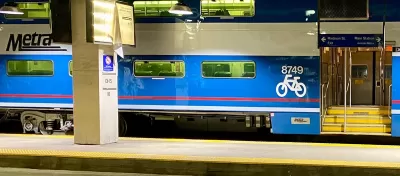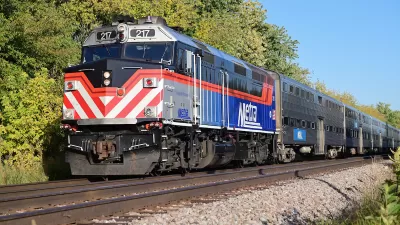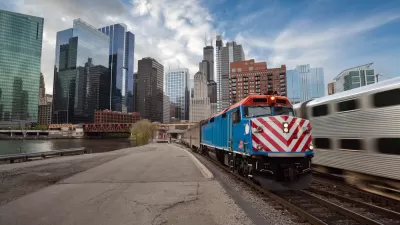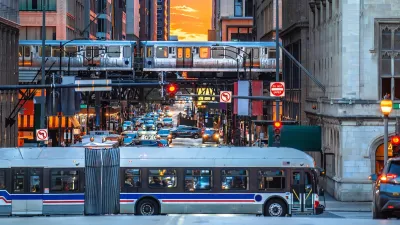Since Metro launched a new bike-friendly policy in February, the number of bikes on its trains rose by 70 percent.

A new policy that allows bikes on all Chicago-area Metra trains has led to a 70 percent increase in bikes carried on trains, reports AJ LaTrace for Streetsblog Chicago.
Metra trains carried 19,000 bikes in February and 220,000 bikes in March of 2024. According to Metra operations director Aaron Maertins, the agency carried the most bikes in its history in 2023.
“Metra staff also provided updates on new bicycle racks and retrofitted train cars that the agency referred to as the “Bike Car 1.5” — train cars with a bike rack with room for upwards of four bicycles (not to be confused with the so-called ‘Bike Car 1.0’ which were old Pullman cars where the lower level was outfitted with space for up to 16 bicycles).” Metra is currently operating 35 of these cars, with five more in staged in their shop.
The article also provides information on Amtrak’s plans to renovate the concourse at Chicago’s Union Station to increase open space to accommodate more riders and make the area easier to navigate.

Study: Maui’s Plan to Convert Vacation Rentals to Long-Term Housing Could Cause Nearly $1 Billion Economic Loss
The plan would reduce visitor accommodation by 25,% resulting in 1,900 jobs lost.

North Texas Transit Leaders Tout Benefits of TOD for Growing Region
At a summit focused on transit-oriented development, policymakers discussed how North Texas’ expanded light rail system can serve as a tool for economic growth.

Why Should We Subsidize Public Transportation?
Many public transit agencies face financial stress due to rising costs, declining fare revenue, and declining subsidies. Transit advocates must provide a strong business case for increasing public transit funding.

How to Make US Trains Faster
Changes to boarding platforms and a switch to electric trains could improve U.S. passenger rail service without the added cost of high-speed rail.

Columbia’s Revitalized ‘Loop’ Is a Hub for Local Entrepreneurs
A focus on small businesses is helping a commercial corridor in Columbia, Missouri thrive.

Invasive Insect Threatens Minnesota’s Ash Forests
The Emerald Ash Borer is a rapidly spreading invasive pest threatening Minnesota’s ash trees, and homeowners are encouraged to plant diverse replacement species, avoid moving ash firewood, and monitor for signs of infestation.
Urban Design for Planners 1: Software Tools
This six-course series explores essential urban design concepts using open source software and equips planners with the tools they need to participate fully in the urban design process.
Planning for Universal Design
Learn the tools for implementing Universal Design in planning regulations.
Ascent Environmental
Borough of Carlisle
Institute for Housing and Urban Development Studies (IHS)
City of Grandview
Harvard GSD Executive Education
Toledo-Lucas County Plan Commissions
Salt Lake City
NYU Wagner Graduate School of Public Service





























